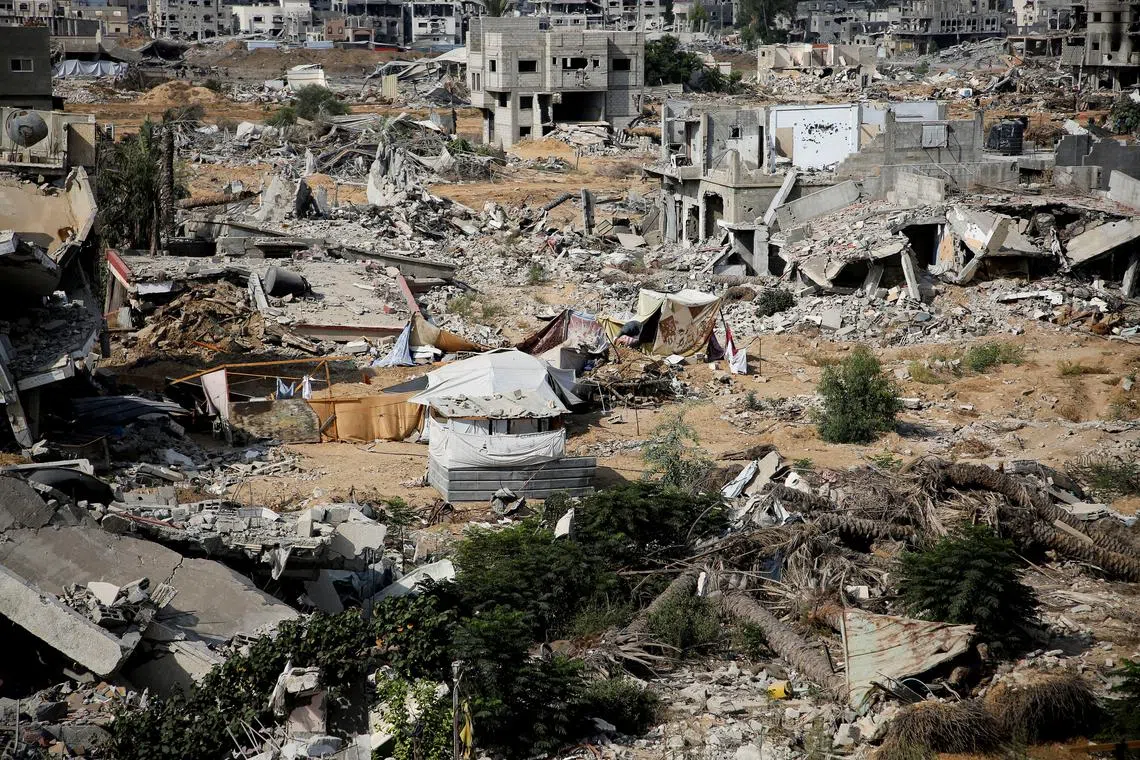UN's Gaza polio vaccinations will rely on pauses in fighting
Sign up now: Get ST's newsletters delivered to your inbox

The pauses in fighting, due to run for three days between 6am and 3pm (11am and 8pm Singapore time), will begin in central Gaza, before moving to south and then northern Gaza.
PHOTO: REUTERS
GENEVA - United Nations officials are preparing to launch a polio vaccination campaign in Gaza on Sept 1 that will rely on a series of limited pauses in fighting between Israeli forces and Hamas militants holding out in the besieged enclave.
The World Health Organisation (WHO) says it will need to vaccinate at least 90 per cent of the children in Gaza for the campaign to succeed, but it faces huge challenges in the Palestinian enclave, which has been largely destroyed by nearly 11 months of war.
The campaign has been organised after the WHO said on Aug 23 that a baby had been paralysed
The WHO named the baby as Abdul-Rahman Abu Al-Jidyan. He will turn one year old on Sept 1.
His mother, Ms Nivine Abu Al-Jidyan, said she feared for her son after she was told by health officials that they could do little to help him.
“I was shocked that my son got this disease amid the war and the closure of border crossings, under these conditions and lack of medicine for him, it’s a shock. Would he remain like this?” Ms Abu Al-Jidyan said on Aug 29.
“He is my only baby boy. It’s his right to travel and be treated; it’s his right to walk, run and move like before... It is unfair that he stays... in the tent without care or attention,” she said, from a tent in Deir Al-Balah in the central Gaza Strip.
Some 1.2 million vaccine doses have already been delivered to Gaza ahead of the campaign, which aims to vaccinate more than 640,000 children, a WHO official said on Aug 30.
An additional 400,000 doses are en route to the territory, said Dr Rik Peeperkorn, the WHO's representative for the occupied Palestinian territories.
The planned pauses are unconnected with negotiations that have been underway for months
Cogat, the Israeli agency that coordinates administration in the occupied Palestinian territories, said the pauses would be coordinated as part of a series of humanitarian pauses implemented periodically since the start of the Israeli campaign in Gaza last October.
Hamas has also agreed to the pauses, which the UN says are needed for the campaign to begin at all. A second round of vaccinations will be needed once the first round is complete.
The WHO has said the Israeli military and Hamas have agreed to three separate, zoned three-day pauses
More than 2,180 staff have been trained to provide vaccinations and information about the campaign to people in Gaza.
The pauses, due to run for three days between 6am and 3pm (11am and 8pm Singapore time), will begin in central Gaza, before moving to south and then northern Gaza.
However, due to the logistical and security challenges facing the campaign, an extra day may be needed for each round, WHO officials have said.
Most of Gaza's hospitals have been damaged or destroyed, with only 17 out of the 36 hospitals in the territory partially functional and less than half of the 132 primary health centres still operational, according to WHO figures.
At Nasser Hospital, in the southern city of Khan Younis, Ms Umm Eliane Bakr fears her 19-month-old daughter may be vulnerable to polio because of ill health brought on by malnutrition.
She hopes her baby will be vaccinated soon, but said she is worried about moving safely in an area where there have been repeated Israeli strikes.
“I need a truce, a ceasefire, so I can give my daughter this injection (vaccine),” she said. REUTERS


